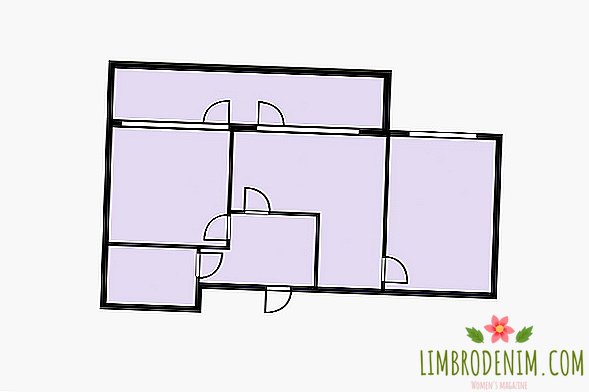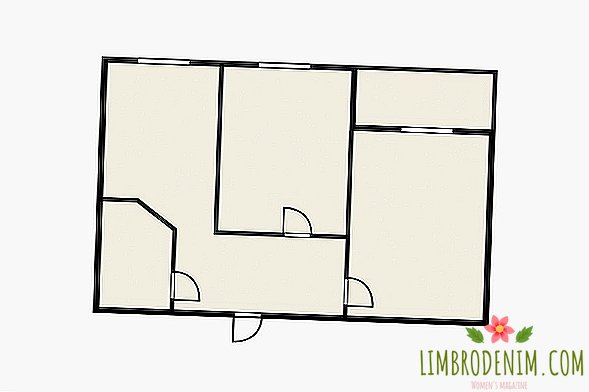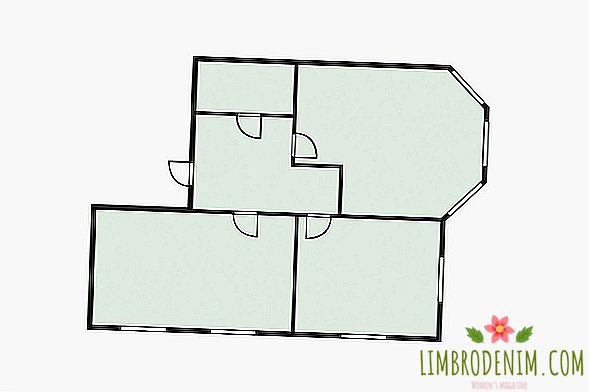Housing problem: How the lack of personal space affects the psyche
Six square meters per person- This is the minimum sanitary standard of living space, established by the current Russian law. The social norm provides for a bit more, from 18 to 42 square meters, depending on the number of tenants, but it is difficult to imagine that this piece of space may be enough for someone to have a comfortable life. However, for many Russians, whether it is a large family or a company renting an apartment in a clubhouse, this is not a fantasy, but an everyday reality.
With the actual lack of personal space and a minimum of square meters, where literally no one turns around, everyone copes in his own way, but this almost always affects the habits of a person and his relationships with others.

 I arrived in Moscow at the age of eleven, before that I lived in Paris in a cool area, in my room. 2001, Medvedkovo, it takes forty minutes to go to school, my grandmother and grandfather live in the room with me, in the next one there is my mother, in fact there is no kitchen. This is an ordinary apartment in a nine-story building, which seems to exist only to survive in it. At least Mom is trying to impose it on me.
I arrived in Moscow at the age of eleven, before that I lived in Paris in a cool area, in my room. 2001, Medvedkovo, it takes forty minutes to go to school, my grandmother and grandfather live in the room with me, in the next one there is my mother, in fact there is no kitchen. This is an ordinary apartment in a nine-story building, which seems to exist only to survive in it. At least Mom is trying to impose it on me.
Living in the same room with my grandparents was easy. In the morning I am at school, during the day with friends - or in my mother's room with the prefix and friends, while mom is at work. In the evening I am in my corner - a folding bed and a wardrobe next to her. It turns out a little corner, as if I'm in a house.
Every year it became harder - more and more infuriated the TV, which grandmother and grandfather are watching. More and more I want to somehow comment on what is happening there. Then, at fourteen, resentment rolls: wow, all friends have their own room, but I don’t. Where again with girls kiss and touch them.
But these are only small episodes - in a routine you rarely think about it. In a strange way, you have paradoxical feelings. On the one hand, you learn to live separately: you spend the night with friends, girls, on the street, if you don’t have enough money for a taxi. On the other - more attached to the house. You know everything about grandparents. And when for some reason no one is home, it becomes even uncomfortable.
Hugging habits. You start to constantly watch something in headphones, read or listen carefully to each of your CDs. In general, I am a rather closed person and I like to go to myself - so, you learn to do it, being not alone. Your posture thus becomes your personal space. I sit in the headphones - so you can not disturb.
Seven on the benches
It is difficult to estimate exactly when a person began to think about the lack of personal space (not to mention the fact that the very idea of the necessary living space strongly depended on the class affiliation: the situation of “seven shops” for a peasant hut was just as common as ten rooms different purposes in a noble house). But it is obvious that the twentieth century, during which the population of the planet grew almost four times, from 1.6 to 6 billion, and the process of transferring people from villages to cities acquired a new scale (at the beginning of the century, only 15% of the population lived in cities, 2007, this figure finally reached 50%), reinforced this feeling many times. Especially among residents of "developed countries", where living under the same roof with their parents after the age of majority is not a tradition, but social stigma.
“Attitude to personal space should be considered, including taking into account sociocultural characteristics,” says Gestalt therapist Vladimir Baskov. “In many Asian countries, the generations of one family live in a small area, and this does not cause anyone to be rejected. So when a Chinese woman breathes in your ear in a queue in Hong Kong in the literal sense, it is quite normal, and no angry looks will help - she is used to the crowd. In the North European countries the situation is different: the rush hour in the Stockholm metro is almost called tending to make it people do not sit through one empty seat, and the next. "
High population density almost always means neglect of personal boundaries, although there are notable exceptions to this rule: in Japan, infinite respect for personal space has become a separate social cult (and, accordingly, the lack of space is difficult).
 The first eighteen years I spent in two rooms Khrushchev on the outskirts of Moscow, along with five other family members: mother, aunt, grandmother, grandfather and brother. And the poodle Tobby. Naturally, like any teenager, I dreamed of my room - to hang it up with posters, lock myself in a fit of anger and listen to music there at the future music center (for which the old apartment did not have enough space). But in fact, for privacy, there was a table with a computer in the corner, so I did not feel any universal discomfort. Even it was always possible to divide three TVs - the main subject in the house for a teen homebody before the advent of computer and the Internet. As a child, at some point I decided that I would always cede TV to my grandmother and grandfather (they say, I still see enough). I'm not sure that I really did this, but I remember this story.
The first eighteen years I spent in two rooms Khrushchev on the outskirts of Moscow, along with five other family members: mother, aunt, grandmother, grandfather and brother. And the poodle Tobby. Naturally, like any teenager, I dreamed of my room - to hang it up with posters, lock myself in a fit of anger and listen to music there at the future music center (for which the old apartment did not have enough space). But in fact, for privacy, there was a table with a computer in the corner, so I did not feel any universal discomfort. Even it was always possible to divide three TVs - the main subject in the house for a teen homebody before the advent of computer and the Internet. As a child, at some point I decided that I would always cede TV to my grandmother and grandfather (they say, I still see enough). I'm not sure that I really did this, but I remember this story.
In fact, now I remember this time with a smile, because it is really fun to live in a big family. I’m not sure that it would be comfortable to continue living like that for adults, but I’m glad that childhood and youth have gone this way. Of course, we sometimes quarreled over trifles, but there were much more happy moments. And since then, for me, a family is not a classic “mom + dad” set, but a big team.

The Pokrovsky Gate
The USSR, which fully felt its urbanization in the post-revolutionary years (at the same time the first communal apartments arose), is located somewhere in the middle in this row. Despite the targeted programs and the promise to give each family an apartment by the year 2000, it did not succeed in overcoming the housing shortage that was partly destroyed during World War II: by the end of the 1990s, there were still 746 thousand communal apartments in Russia.
The tightness of the communal apartments, even if they acquired a romantic fleur thanks to films like “The Pokrovsky Gates,” remained a nightmare for many Soviet citizens. Compared to them, even the modest footage in the "wormholes" and panel houses of the later construction was felt as a breath of fresh air. Feel the beauty of personal space, however, the Soviet people did not have time: ironically, the relocation to new homes in the 50s and 60s in the USSR provoked a demographic boom, so that even in their own apartment, family members often had to "sit with each other on their heads. "
Probably, this is exactly where the roots of the current contradictory attitude to personal space in Russia should be sought: on the one hand, there is an acute need for own corner (and rather a separate room), on the other - an inherited understanding that there should not be enough housing for everyone, which means , make room - this is normal.
 I lived in small spaces for quite a long time, since I was studying at a school in another city. She lived in the dormitories from the seventh grade to the last year of uni - a total of ten years. After that, I lived in Moscow in a tiny apartment on Prospect Mira for another seven years.
I lived in small spaces for quite a long time, since I was studying at a school in another city. She lived in the dormitories from the seventh grade to the last year of uni - a total of ten years. After that, I lived in Moscow in a tiny apartment on Prospect Mira for another seven years.
The hostel is something else, forced, there are a lot of people around you in the same conditions. And when you live in an apartment, you can live alone, and often people themselves choose small spaces.
I have never had any problems with my personal space, because I have experience. In principle, I am a patient person, and the habits of someone near me in a confined space do not annoy me. In addition, I do not react to external stimuli: if I need to write something, I can sit in a room where the music is screaming, guests have come, or someone is watching a movie, and doing my business. Many say that you need your own quiet space where you can close. I have no such traction.
Separate jokes - about the organization of space. I called my small apartment “Tetris house”: in order to move from one corner of the room to another, it is necessary to move some things.
Now we live in the "treshka", and at first there was a feeling that you have to walk a lot. Before how? Stretched hand - you can already open the cabinet. And now you need to go somewhere. When we first settled in a large apartment, the first two months lived in a bedroom, but did not use the hall and kitchen. Why are these rooms needed? Here is the hall - what is it for? Just to sit? Meet the guests? Not very clear - this is all you can do in the bedroom. Separate room to eat is, of course, a luxury.

Personal space
Now there is no doubt that the lack of the opportunity to be alone can be extremely traumatic - especially in childhood and adolescence. The habit of being in public all the time, often under parental supervision, and the need to get involved in someone else's life distorts a person’s perception of personal boundaries (both his own and others). “Violation of boundaries can lead to conflicts. A person can develop a habit: any violation of boundaries after an accumulated traumatic experience can cause aggression or isolation,” says Vladimir Baskov.
According to him, “in conditions when people live together in one room, each of them has very little space, a person can almost completely choke on his reactions due to constant retraumatization, as his borders are constantly exposed to external influences. A person gets used to that there is no space of its own, and it begins to submit to external factors very, very strongly. And this cannot be compared to constant trips to the metro at rush hour, because you leave the car and your personal space reappears. Besides, you know wb that transport is temporary. "
Psychologists explain the need for solitude in different ways (including the transformed animal instinct of the struggle for "their territory"), but in any case it is worth remembering that this is not a whim, but a simple necessity even for the communicative person.
 We lived together in a three-room apartment: in two, fairly large rooms - two guys, in the third, not very large (maybe thirteen meters) - we are with a neighbor. It was very cool: constantly communicate with someone, someone comes, someone leaves, someone brings guests, someone his girlfriend. Nobody worked in the office, so everything was pretty relaxed. There were no lines in the bathroom, if someone was in a hurry, they let him through without any problems. Every Wednesday in the room where there was a TV, they organized a movie night - they watched movies all together - and guests came to us.
We lived together in a three-room apartment: in two, fairly large rooms - two guys, in the third, not very large (maybe thirteen meters) - we are with a neighbor. It was very cool: constantly communicate with someone, someone comes, someone leaves, someone brings guests, someone his girlfriend. Nobody worked in the office, so everything was pretty relaxed. There were no lines in the bathroom, if someone was in a hurry, they let him through without any problems. Every Wednesday in the room where there was a TV, they organized a movie night - they watched movies all together - and guests came to us.
We have always very much emphasized that we have not a communal flat, no one locks himself in his room, everyone cooks together and eats together. Everything is common. I understand that not everyone would be able to withstand this, and for the first two weeks it was very unusual and difficult for me. But then I fell madly in love with all the guys and became very close to them all. My former neighbor is now like an older sister to me, which I have never had. And she began to treat me like a sister.
There were, of course, disadvantages: “six people in an apartment” means a lot of dirt, and do not clean it - everything clogs up in one day at best. Retire at home in this situation is also very difficult. Therefore, when I wanted to be alone, I went for a walk or to a bar. But sometimes this was not enough - that on the street, that in the bar you are still not left completely alone.
I lived in such an apartment for nine months and moved out only because everything began to fall apart sharply: a neighbor decided to move in with her boyfriend, another neighbor moved out because his parents had given him an apartment. Honestly, I would have lived further if it were not for this.
Now I am in a three-room apartment, where besides me there are only two girls. The first couple of days were unusual and even lonely, but the day on the third was already used to it. There are forces to do something for yourself: read books, draw. When you constantly communicate with someone, there are not enough emotions for such things, you just want to lie down with the phone and not think about anything.
Less is more
An adult person lack of square meters, however, affects not less. If communal housing is simply more dangerous for health (for example: in the book of Gubernsky and Litskevich's Residence for Man, it is reported that tuberculosis in Latin America ranks second in terms of prevalence among infectious diseases precisely because of its compact residence) not express it explicitly.
By the lack of space, people adapt and do not always feel like hostages of circumstances. The course on minimalist interior design and the desire not to acquire unnecessary things, by and large, is nothing more than a struggle of a modern person for personal space. Not everyone can afford to settle or move to a more spacious mansion. But even the general cleaning of the apartment can significantly improve the feeling of staying in it.
Photo:shooarts - stock.adobe.com, shooarts - stock.adobe.com




